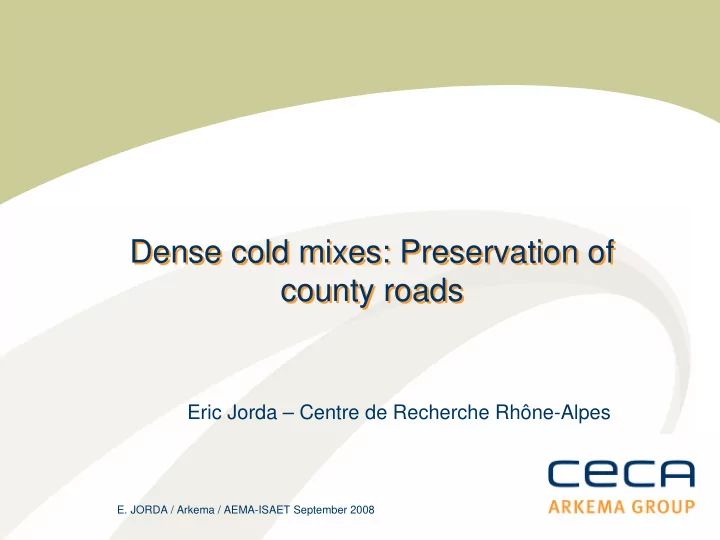

Dense cold mixes: Preservation of Dense cold mixes: Preservation of county roads county roads Eric Jorda – Centre de Recherche Rhône-Alpes E. JORDA / Arkema / AEMA-ISAET September 2008
Dense cold mixes Definition : “Emulsion mix asphalt, not or shortly storable (for use in 24 hours and never more than 48 hours), for use as wearing course and constituted of selected aggregates totally coated with binder” “A fraction of the aggregates could be precoated either by emulsion or by hot asphalt binder prior to the final coating. The final coating is always done using emulsion.” Developed for more than 20 years in France Cheap and easy to produce Particularly suitable for pavement preservation EJ / ARKEMA / AEMA-ISAET September 2008
Standard production scheme Preferentially soft asphalt PG aggregates water emulsion 64-22 0/6 à 0/20 mm Emulsion 60-65% asphalt 2 to 6% 6 to 7% Emulsifier : Slow cationic 0,4 to 1 % based on emulsion weight pH=2 (HCl or H 3 PO 4 ) pugmill Laboratory study study is is absolutely necessary absolutely necessary Laboratory to adapt emulsion adapt emulsion to to aggregate aggregate for for this this type type to of road application of road application EJ / ARKEMA / AEMA-ISAET September 2008
Main steps for laboratory study Step 1: Definition of aggregate gradation curve and properties Adaptation of gradation curve Fine particles surface area measurement Aggregate reactivity in acidic medium Step 2: Definition of a minimum total water content Essentially for coating purpose Step 3: Definition of a total emulsifier content Essentially for mix time tuning and depending on the way of working of the company Step 4: pH adjustment (and acid type) As a function of aggregate properties Step 5: Definition of a minimum emulsion content Could be calculated by comparison of asphalt droplets surface area in the emulsion and aggregate surface area Step 6: Final composition optimized considering mechanical properties of the mix Workability at short time Mechanical and moisture resistance after ageing EJ / ARKEMA / AEMA-ISAET September 2008
Mixing time, coating and workability evaluation Principally 2 ways of working for mixing time Long mixing time (several hours) : emulsion setting after compaction Short mixing time (< 20 s): emulsion setting in the pugmill Workability evaluation depending on company uses Short time mixing (20s) and storage for hours then rehandling. Short time mixing (20s) and storage under constraint for hours then rehandling. Workabilimeter Nynas Mix rheology measurement … Coating evaluation is mainly visual just after mixing or after rehandling when emulsion setting is complete EJ / ARKEMA / AEMA-ISAET September 2008
Mixing process Several possibilities depending on the plant 1) Standard process 2) Process with sequential coating 0/d d/D 0/d water emulsion water emulsion emulsion 3) And also processes with precoated selected fractions… Standard process is enough considering mechanical properties but a better coating is achieved with the other processes EJ / ARKEMA / AEMA-ISAET September 2008
Examples of coating and workability evaluation Coating evaluation after rehandling when emulsion setting is complete on 2 different formulas Workabilimeter Nynas EJ / ARKEMA / AEMA-ISAET September 2008
Examples of cold mix properties evaluations Compressive strength as a function Giratory compactor of curing time and conditions Void content Cohesion Drainage Immersion resistance (r/R Duriez) EJ / ARKEMA / AEMA-ISAET September 2008
Jobsite example 2 10 cm thick layers (4 inches) North - west of France with grave emulsion : Aggregates 0/14 (D<1/2 inch) 4.2% asphalt 70/100 (PG 64-22) Emulsion with 65% asphalt and 0.7% Polyram L90 1 6 cm thick layer (2.5 inches) with dense cold mix : Aggregates 0/10 (D<3/8 inch) 5.7% asphalt 70/100 (PG 64-22) Emulsion with 65% asphalt and 0.6% Polyram S + Stabiram CM508 0.3 % Void content @1,5 mois : 19,3% without CM508 16,6% with CM508 New construction EJ / ARKEMA / AEMA-ISAET September 2008
Example of pavement preservation jobsite Reprofiling + wearing course in south-west of France Granite aggregate 0 -10 mm (D<3/8 inch) 8.8% Emulsion with 65% asphalt 70-100 (+0.8% kerosen) (Polyram L80 5kg/t + H 3 PO 4 ) Sequential coating process (sand fraction added at the end of the pugmill) EJ / ARKEMA / AEMA-ISAET September 2008
Example of pavement preservation jobsite Standard compaction train for dense cold mix : Vibrating roller plus rubber-tired roller EJ / ARKEMA / AEMA-ISAET September 2008
Example of rehabilitation of rural road Bielorussia Dense cold mix 0/10 mm (D<3/8 inch) Asphalt emulsion with 7 kg/t Polyram L90 / HCl as emulsifier Production with a portable plant EJ / ARKEMA / AEMA-ISAET September 2008
Laying with a paver is highly recommended Better smoothness than with a grader 10 cm thick layer maximum (4 inches) EJ / ARKEMA / AEMA-ISAET September 2008
Compaction with mixed compactor Two separate compactors should be better using one to two passes with vibrating roller and finishing with rubber-tired roller EJ / ARKEMA / AEMA-ISAET September 2008
Environmentally friendly tamper EJ / ARKEMA / AEMA-ISAET September 2008
Final result Still good aspect after hard winter time under traffic EJ / ARKEMA / AEMA-ISAET September 2008
Conclusions about dense cold mix Very convenient product for preservation of flexible pavement. Cheap, easy to use and environmentally friendly. It allows making in one job what needs generally a two steps process to be achieved. No need for closing road when working reopening to traffic occurs just after compaction. A complete and accurate laboratory study is necessary before going to the jobsite EJ / ARKEMA / AEMA-ISAET September 2008
Recommend
More recommend